- Home
- David Liss
The Coffee Trader Page 6
The Coffee Trader Read online
Page 6
Instead he nodded sharply, almost as though trying to shake something out of his hair, and the three men disappeared together into the front room.
Hannah had made a habit of eavesdropping, despite her intentions to obey her husband’s wishes. A year before, she had found Annetje, in the great tradition of Dutch servant girls, pressing her ear against the heavy oak door to the antechamber. Inside, Daniel’s nasal voice vibrated, muffled and incomprehensible, through the walls. Now she could no longer recall to what the girl had been listening. Daniel with a tradesman? Daniel with a business partner? It might have been Daniel with that nasty little portrait painter who once, when he had got Hannah alone, had tried to kiss her. When she protested, he’d said it was no matter and that she was too plump for his taste anyhow.
Hannah had walked into the hall to find Annetje with her face against the door, her dung-colored cap pushed askew by the force of her eagerness.
Hannah had placed her hands upon her hips. She screwed her face into a mask of authority. “You mustn’t eavesdrop.”
Annetje had turned from the door for an instant, not even the hint of a smile on her pale Dutch face. “No,” she’d said. “I must,” and so resumed her business.
There had been nothing for Hannah to do but to press her ear against the door herself.
Now she could hear Parido’s muffled voice on the inside. “I was hoping I might have a moment to speak with you,” he said.
“You might have taken that moment last night. I surely saw you at the Talmud Torah.”
“Why should he not have been at the Talmud Torah?” Daniel asked. “He is a parnass.”
“Please, Daniel,” Parido said quietly.
A moment of silence and then Parido began again. “Senhor, I have but this to say. Things have been uneasy with us for a long time now. After the business with Antonia, you sent me a note in which you offered an apology, and I was uninterested at the time. I now regret my coolness toward you. Your behavior was foolish and inconsiderate, but not malicious.”
“I will agree with that assessment,” Miguel said, after a moment.
“I don’t expect us to become great friends in an instant, but I would like to see less discomfort between us.”
A brief pause, and sounds like the drinking of wine. Then: “I have felt particular discomfort when you brought me before the Ma’amad.”
Parido barked out a laugh. “Do me justice and acknowledge that I never charged you unfairly, nor have you ever faced serious punishment. My duties as a parnass require that I guide the behavior of the community, and in your case I have tried to show mercy out of affection for your brother rather than be cruel out of resentment toward you.”
“It is strange that it never occurred to me.”
“You see?” Daniel said. “He has no interest in ending animosities.”
Parido seemed to ignore him. “We have been angry with each other these two years. I cannot expect for us to be friends because I say so. I only ask that you not look to extend hostilities, and I will do the same, and in time we may come to trust each other.”
“I appreciate your words,” Miguel said. “I’d be happy if things could become easy between us.”
“The next time we see each other,” Parido pressed, “we will meet if not as friends then at least as countrymen.”
“Agreed,” Miguel said, with a bit more warmth. “I thank you for this gesture.”
Hannah heard scraping sounds, like feet shuffling toward the door, and dared not risk remaining in the hall any longer.
Women were not made privy to business affairs, but she knew that Parido had long done what he could to harm Miguel’s dealings. Could he now trust this offer of friendship, coming as it did so suddenly? It put Hannah in mind of children’s stories, of witches who lured children into their homes with promises of sweets, or hobgoblins who tempted greedy travelers with gold and jewels. She thought to warn Miguel, but he scarcely needed her wisdom. Miguel knew a witch or a hobgoblin when he saw one. He would not be easily fooled.
4
Though he had more pressing things to consider, Miguel visited a bookseller near the Westerkerk and found a translation of an English pamphlet extolling the virtues of coffee. The author wrote with an enthusiasm that dwarfed Geertruid’s. Coffee, he insisted, has all but destroyed the plague in England. It preserves health in general and makes those who drink it hearty and fat; it helps the digestion and cures consumption and other maladies of the lung. It is wonderful for fluxes, even the bloody flux, and has been known to cure jaundice and every kind of inflammation. Besides all that, the Englishman wrote, it imparts astonishing powers of reason and concentration. In the years to come, the author said, the man who does not drink coffee may never hope to compete with the man who avails himself of its secrets.
Later, down in his space in Daniel’s cellar, Miguel fought back the urge to pick up a pewter pitcher and hurl it against the wall. Should he give his attention to coffee or brandy? Could he separate the two? The brandy business pulled him down like a weight on a drowning man, but coffee could be the very thing to buoy him up.
He turned for comfort, as he increasingly did, to his collection of pamphlets. Since coming to Amsterdam, Miguel had discovered a love of Spanish adventures, translated French romances, marvelous travel stories, and, most of all, salacious tales of crime. Of these accounts of murderers and thieves, Miguel loved best the pamphlets recounting the adventures of Charming Pieter, the clever bandit who had been playing his wily tricks on the foolish rich in and around Amsterdam for years. Geertruid had first introduced him to the adventures of this scoundrel hero who, she said, along with his Goodwife Mary, embodied the very core of Dutch cleverness. She read the pamphlets eagerly, sometimes aloud to her man, Hendrick, and sometimes to an entire tavern of men, who laughed and hooted and toasted this thief. Were the stories true, were they mere fictions like Don Quixote, or something in between?
Miguel had resisted the allure of these stories at first. In Lisbon he had never bothered with lurid accounts of murderers and executions, and now he had reading enough with his studies of Torah. Nevertheless, Charming Pieter had won him over; Miguel had become enchanted by the bandit’s celebration of his own duplicity. The Conversos of Lisbon had been duplicitous by necessity, even those who fully embraced the Catholic Church. A New Christian could be betrayed at any time by a victim under an Inquisitor’s knife. Miguel had habitually lied, hidden facts about himself, eaten pork in public; he had done anything to prevent his name from being the one to come to a prisoner’s lips. Deception had always been a burden, but Pieter reveled in his duplicity. Miguel was enchanted by these tales because he longed, like Charming Pieter, to be a trickster instead of a liar.
Now he tried to lose himself in one of his favorite stories, that of a rich burgher who, entranced by Goodwife Mary’s beauty, had thought to cuckold Pieter. While she provided a distraction with her wit and artful ways, Pieter and his men carried off all of the burgher’s possessions. After turning the burgher out of his own home, naked to the world, Pieter and Mary opened up the man’s larder to the people of the village and allowed them to feast upon his wealth. And so, in his own way, Charming Pieter carried out the justice of the common folk.
When he closed the little volume, Miguel was still thinking about brandy and about coffee.
That afternoon, he received a letter from the usurer Alonzo Alferonda, with whom he maintained a cautious friendship. Alferonda had a reputation as a man dangerous to neglect—dozens of blinded and lamed debtors in Amsterdam would testify to that—but Miguel found Alferonda’s hobbled victims hard to reconcile with the plump and jovial fellow who seemed to have an infinite store of kindness. The Ma’amad would have destroyed Miguel for his congress with a man it had expelled, but Alferonda’s company was too merry to set aside. Even in his exiled state, he had knowledge and information, and he never hesitated to pass it along.
Some months ago, Miguel had mentioned a rumor he’d heard, and A
lferonda volunteered to find out what he could. Now he claimed to have learned something important and requested that they talk—always a tricky business, but usually managed well enough with a bit of caution. Miguel wrote to Alferonda suggesting they meet in the coffee tavern, which he had found by inquiring of a few men in the East India trade.
Miguel knew only that the place was located in the Plantage, which stretched out east of the Vlooyenburg, endless walks cutting through sculpted gardens. Square paths crisscrossed walkways, peopled with the high and the low alike. The burgomasters had ruled that no permanent buildings might stand on its verdant grounds, so all structures here were made of wood, ready to be taken apart should the city so decree. On pleasant evenings, the Plantage became a garden of delights for those who had the coin and the inclination. Strollers could walk among bands of fiddlers and fife players. On the well-lighted paths, entrepreneurs had set up tables and poured beer and served sausage or herring or cheese; in houses hardly more than huts, a man could buy delicacies of a more human kind.
Miguel located the meeting place with difficulty, after asking several other proprietors for directions. Finally he came upon what he suspected was the right building, a poor wooden structure built at crazed angles, hardly looking fit to withstand a rainstorm. Miguel found the door locked, but a nearby brothel keeper had assured him that it was the right place, so he knocked loudly.
Almost at once the door opened a crack and Miguel stared at a dark-skinned Turk in a yellow turban. The man said nothing.
“Is this the coffee tavern?” Miguel asked.
“Who are you?” the Turk grunted in muddled Dutch.
“Is the tavern private? I did not know.”
“I did not say it was. I did not say it wasn’t. I only asked who you are.”
“I’m not sure my name will mean anything to you. I am Miguel Lienzo.”
The Turk nodded. “Senhor Alferonda’s friend. You may come in. Senhor Alferonda’s friends will always find themselves welcome here.”
Senhor Alferonda’s friend? Miguel had no idea that Alferonda had even heard of coffee, but apparently he was well known among the Mohammedans. Miguel followed the Turk into the building, hardly more impressive on the inside than the outside. Rough chairs and tables sat on a damp earth floor. At once he was overwhelmed by the scent of coffee, far more intense and pungent than what he had smelled at Geertruid’s cousin’s tavern. On a half dozen or so benches sat an odd assortment of men: Turks in turbans, seafaring Dutchmen, a hodgepodge of foreigners—and one Jew. Alonzo Alferonda sat conversing with a tall Turk in faded blue robes. He whispered something as Miguel approached, and the Turk departed.
Alferonda stood to greet Miguel, though standing only emphasized his shortness. He was a rounded fellow with a wide face and large eyes hidden behind a thick beard of slightly graying black. Miguel could scarce believe there were many men who trembled before this pudgy face. One night they had walked together after drinking at a tavern near the docks. A pair of thieves had leapt from an alley, knives brandished, set to take their purses. One look at Alferonda, and they scurried away like frightened cats.
“I was surprised you asked to meet here,” Alferonda said. “I had no idea you had any taste for coffee.”
“I might say the same of you. I’ve only just learned of it. I wanted to see what a coffee tavern would be like.”
Alferonda gestured for them to sit. “It is not much, but they obtain good fruit, and the demand is low enough that they rarely run out.”
“But supplies are sometimes short?”
“They can be.” The usurer studied Miguel. “Coffee is controlled by the East India Company, and as there is not much demand in Europe, the Company doesn’t import a great quantity. It mostly trades the fruit in the East. What do you care about the supplies?”
Miguel ignored the question. “I’d forgotten you’d lived in the Orient. Of course you know coffee.”
He opened his hands wide. “Alferonda has lived everywhere and has connections everywhere, which is why you seek him out.”
Miguel smiled at the hint. “You have information?”
“Excellent information.”
Miguel had asked Alferonda to inquire into a rumor he’d overheard regarding Parido’s involvement in an impending whale-oil trade. He’d been hesitant to pursue this affair; it would be dangerous to oppose the parnass in matters of business. Still, Miguel only sought information, he told himself. He needn’t act on it.
“You were certainly right about Parido,” Alferonda began. “He has a spy inside the East India Company.”
Miguel raised his eyebrows. “I would have thought that beyond even his ambition.”
“The Company is not so powerful as it would have you believe. Gold works for Company men as it does for everyone else. Parido has learned that they plan to buy large quantities of whale oil to sell in the Japans and Cathay, but these Company fellows have the patience to wait for the price to drop since they know production has been climbing steadily of late. Parido has been quietly collecting whale oil on other exchanges—just a little here and there, you understand—and hopes to flood the market slowly enough to lower the price without raising suspicion. Meanwhile, he and his combination are also buying calls, which will allow them to secure the current low prices.”
Miguel let out a breath. “I am no friend of that man, but I am impressed. At some point the East India Company will decide the price is low enough to buy and stock their own warehouses, and when that happens the price goes up. Meanwhile, Parido’s combination has the calls, which allow them to buy at the artificially lowered price and then turn around and sell at the new inflated price.” Trading combinations manipulated the markets all the time, but this plan—buying on other exchanges, creating a market to tempt a buyer—was beyond anything Miguel had ever heard. “How did you learn all this?”
Alferonda smoothed his beard. “Anything that is known can be learned. You hear rumors about whale oil, I ask some questions, and soon everything is revealed.”
“When will this trade take place?”
“Sometime next month, between this reckoning day and the next. I hardly need say anything to you, but as your friend I must warn you to proceed carefully. You may hitch a ride on Parido’s venture if you like. He’ll scowl that you should have profited from his work, and that’s nothing, but do him no harm that he can see or he’ll never forgive you.”
“You must think me addled to lecture me about that,” Miguel said good-naturedly.
“Not addled, but I would hate to see your eagerness undo your ambitions. Now, I’ve already bought whale oil at its low price, and I suggest you do so too as quickly as you can.”
“It will have to wait until after this reckoning day. I hope to have a few coins to my name then.”
A Turk placed two small bowls before them. They were smaller than any drinking vessels Miguel had ever seen and contained a liquid black and thick as mud.
“What is this?” Miguel asked.
“It’s coffee. Have you not tried it yet?”
“I have,” Miguel said, as he picked up the bowl and held it closer to an oil lamp, “but it seemed a different thing than this altogether.”
“This is how the Turks drink it. They boil it three times in a copper pot to darken and distill it. In their native land, they often serve it with great ceremony. But Amsterdammers have no time for the frivolity of ritual. Be careful. Let the powder rest at the bottom.”
“When I drank it before,” Miguel said, eyeing the drink skeptically, “it was made with milk. Or sweet wine. I can’t recall.”
“The Turks believe that combining milk and coffee causes leprosy.”
Miguel laughed. “I hope not. You seem to know a great deal about coffee. What else can you tell me?”
“I can tell you about Kaldi, the Abyssinian goatherd.”
“I don’t know that I have any interest in goatherds.”
“You’ll find this one interesting. He lived qui
te some time ago, tending his flock in the hills of Abyssinia. One afternoon he noticed that his goats were much more lively than usual, dancing about, raising up on their hind legs, bleating out their little goat songs. Kaldi spent several days watching them, and they grew increasingly more lively. They ran and played and hopped about when they should have been sleeping. They danced and sang instead of eating.
“Kaldi was certain a demon had possessed the goats, but he summoned his courage and followed the beasts, hoping to catch a glimpse of this fiend. The next day, he saw that the goats had come upon a strange bush. After they ate the fruit of the bush, they once again began to leap about. Kaldi ate some of the berries himself, and soon he could not resist the urge to dance with the goats.
“A holy man happened by at that time and asked Kaldi why he capered with his herd. He explained that he had eaten the fruit of the bush, and it had filled him with untold vigor. So the holy man, who was rather a boring fellow, took some fruit home. He was plagued by the fact that his students would fall asleep while he was lecturing, so he made a drink out of the berries and fed it to his students before he lectured. Soon he was known throughout the world of the Mohammedans as a man who could deliver discourses from sundown to sunup without his students falling asleep.”
Miguel paused for a moment. “That is very interesting, but I thought to inquire about the coffee trade as it is now, not among Abyssinian goatherds.”
Alferonda raised one eyebrow. “There is no vigorous coffee trade outside of the Orient, and the East India Company controls that. Not much remains for the rest of us.”
“But you are speaking about the East. Perhaps coffee would be of interest to men here in Europe. I, for one, have no love of sleep. I see it as a waste of time. If I could drink coffee instead, I would be most pleased.”
“You would have to sleep in the end,” Alferonda said, “but I take your point. Men who drink coffee come to love it beyond all things. I’ve heard that among the Turks a woman can divorce her husband if he does not provide her with enough coffee. And the coffee taverns of the East are strange places. There the drink is combined with powerful medicines, like poppy extract, and men go to such places in search of pleasures of the flesh.”

 The Whiskey Rebels
The Whiskey Rebels Renegades
Renegades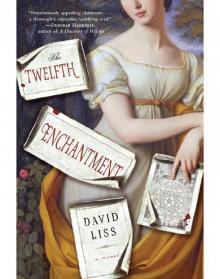 The Twelfth Enchantment: A Novel
The Twelfth Enchantment: A Novel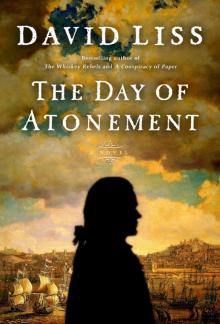 The Day of Atonement
The Day of Atonement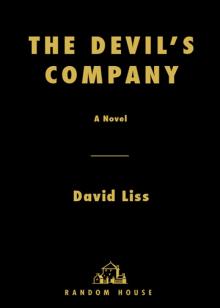 The Devil's Company
The Devil's Company Randoms
Randoms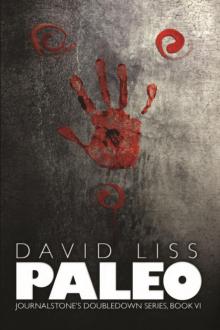 Paleo / The Doomsday Prepper
Paleo / The Doomsday Prepper Rebels
Rebels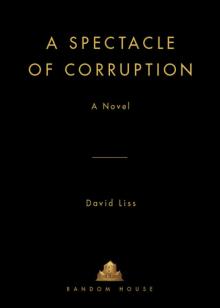 A Spectacle of Corruption
A Spectacle of Corruption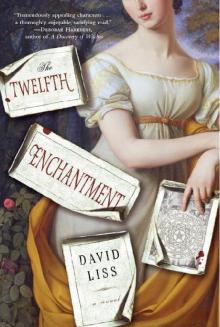 The Twelfth Enchantment
The Twelfth Enchantment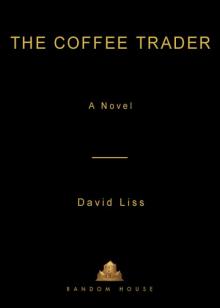 The Coffee Trader
The Coffee Trader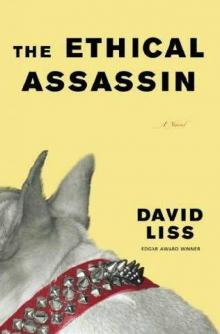 The Ethical Assassin
The Ethical Assassin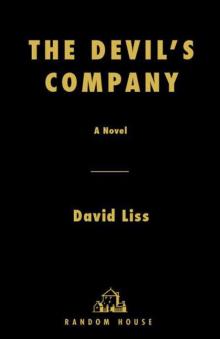 The Devil’s Company: A Novel
The Devil’s Company: A Novel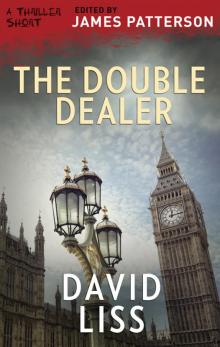 The Double Dealer
The Double Dealer The Whiskey Rebel
The Whiskey Rebel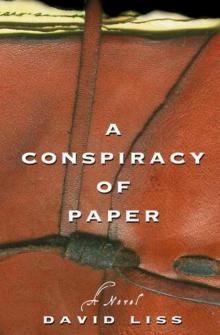 A Conspiracy of Paper bw-1
A Conspiracy of Paper bw-1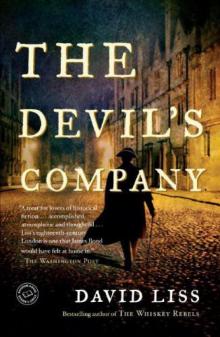 The Devil's Company bw-3
The Devil's Company bw-3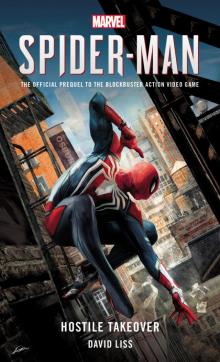 Marvel's SPIDER-MAN
Marvel's SPIDER-MAN